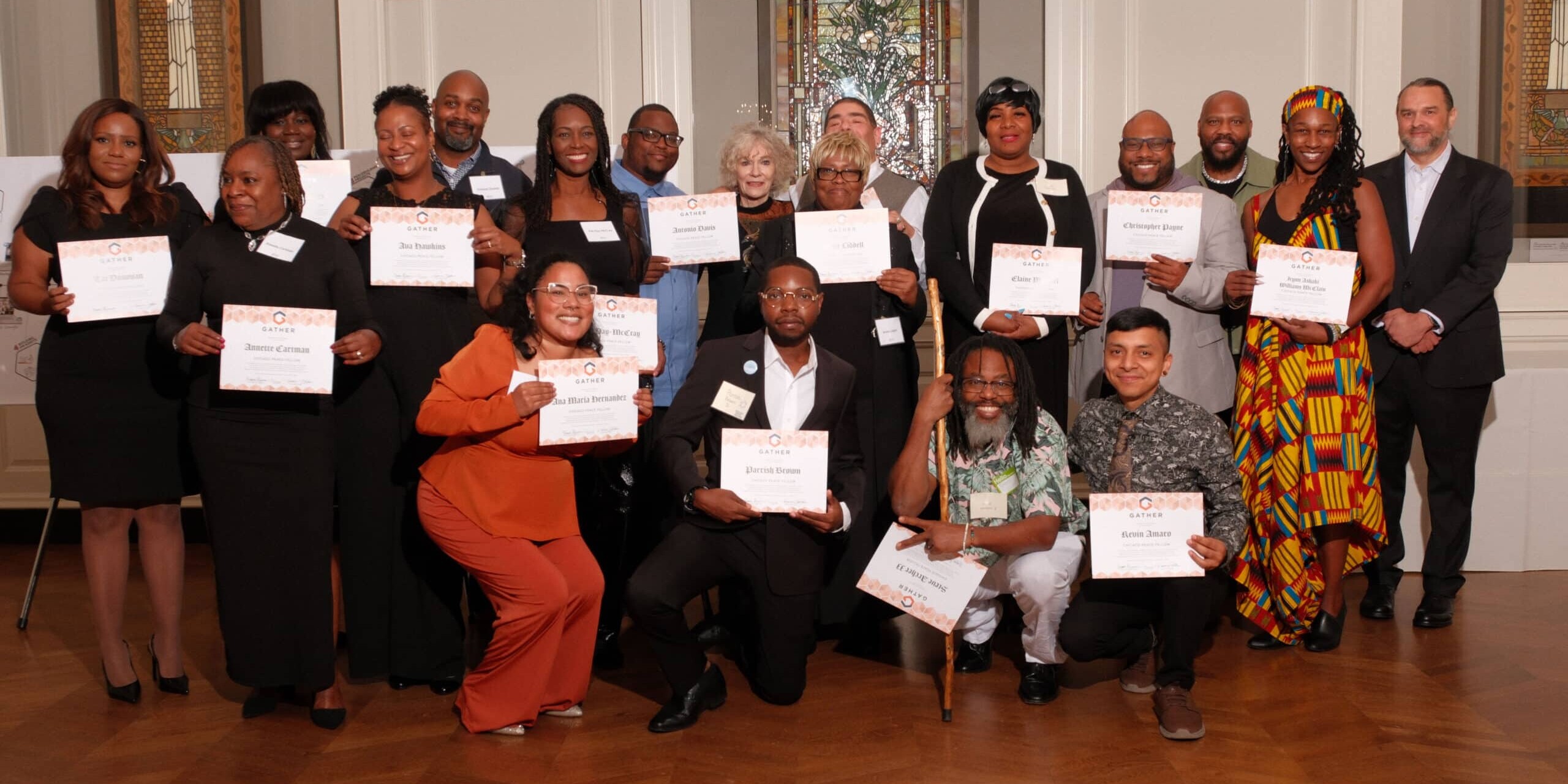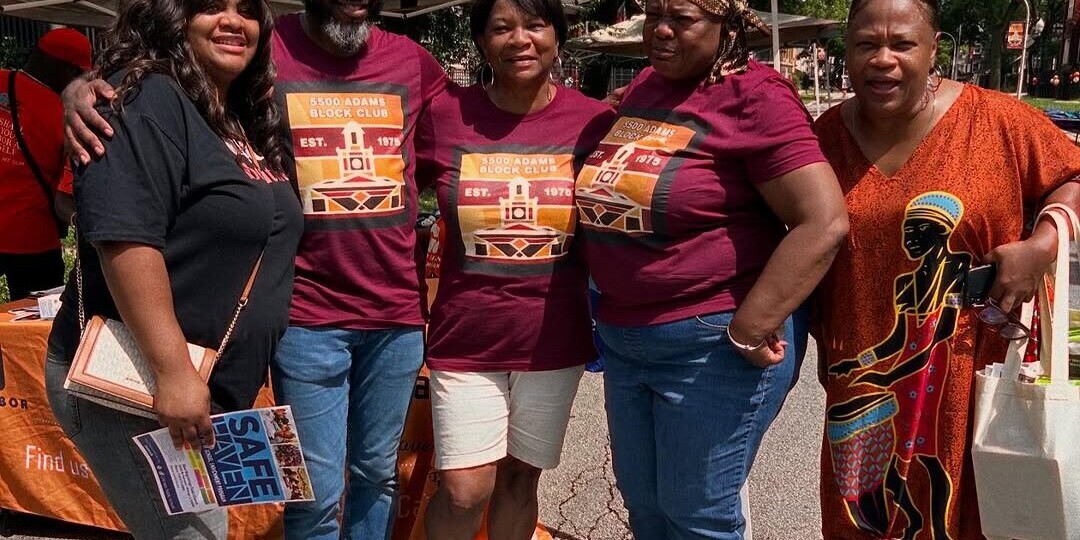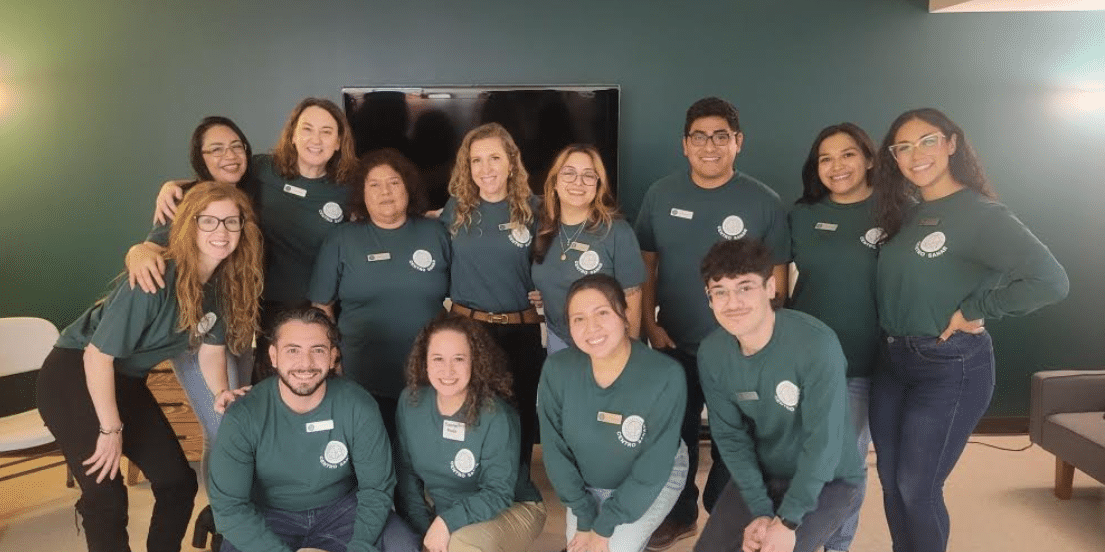With the first cohort of the Chicago Peace Fellows finishing their summer projects and nearing the end of their curriculum, the Goldin Institute convened a dinner meeting of prominent advisers on Thursday, September 12, to discuss strategies for sharing the Fellows’ accomplishments and wisdom during their upcoming graduation.
Held at the Erie Café in the city’s River North neighborhood, this was the third advisors dinner, and was attended by Goldin Institute Founder and Board Chair Diane Goldin, GATHER alumnus Raymond Richard, founder of Brothers Standing Together, a Chicago-based non-profit organization; Leslie Ramyk, Executive Director, Conant Family Foundation; Teresa Zeigler and John Zeigler, director of DePaul University’s Egan Office of Urban Education and Community Partnerships; Mimi Frankel, a member of the Frankel Family Foundation’s Board of Directors and the Goldin Institute’s Board of Advisors; Lisa Dush, a DePaul University professor who is conducting an academic evaluation of GATHER; Justice Stamps, who runs the Marion Nzinga Stamps Youth Center mentoring program on the Near North Side; José Rico, a Director of Truth, Racial Healing and Transformation for Greater Chicago; Rob Rejman, vice president, Ascent; as well as Goldin Institute staff led by Executive Director Travis Rejman, along with Oz Ozburn, Jimmie Briggs and Burrell Poe.
The Goldin Institute team began with an update on the many workshops and events that the Peace Fellows have participated in, including the strategy session with the Crime Lab at the University of Chicago, the exploration of the role of urban planning and design in building safe communities with Studio Gang and the Rebuild Foundation and the meeting with Alderman Burnett on how grassroots leaders can more effectively collaborate with city-wide initaitives.
All the participants framed the Peace Fellows’ work in the context of the continuing unacceptable levels of violence in some Chicago neighborhoods. Jose Rico spoke about the Truth, Racial Healing & Transformational Initiative as well as about regular meetings in the office of Chicago’s newly elected Mayor Lori Lightfoot, and how the Fellows’ work could inform their discussions.
The Conant Foundation’s Leslie Ramyk said Chicago’s philanthropic leaders were mobilizing beyond their daily duties to respond to the crisis, including collaborating to publish a recent Op Ed, Enough With Hate, in Crain’s Chicago Business. Many family foundations are responding to the violence, moreover, by seeking out and listening to community leaders, using their leverage, power and privilege to try and make the social standard more equitable.
[quote]“This is outside of our job descriptions. We do it because of the necessity of this crisis.” — Leslie Ramyk, Conant Family Foundation[/quote]
Mimi Frankel of the Frankel Family Foundation observed, “We are dealing with a totally different environment than we have had before.”
Goldin Institute Executive Director Travis Rejman talked about the importance of building a movement of connected peace-makers and quoted the maxim, “Great leaders don’t inspire movements, movements inspire great leaders.”
Senior Adviser Jimmie Briggs suggested building interest from journalists in the Peace Fellows’ efforts through various efforts, including a panel discussion. As a New York-based writer with roots in the Midwest, Jimmie was enthusiastic about the potential for the Fellows’ stories to reach a broad audience.
[quote]“Visiting this city can feel like you’re in different countries as you go from neighborhood to neighborhood. Some areas are safe and some aren’t and you can live in this city and have fully different experiences.” — Jimmie Briggs[/quote]
He added that a narrative encompassing all the Peace Fellows’ diverse experiences would be inspirational. “If there is no narrative out there, it didn’t happen,” Jimmie cautioned.
Program Coordinator Burrell Poe said that when he was interviewing Fellows, one of their most common requests was to meet others doing similar work. Now that the program is up and running, he was proud to have facilitated the Fellows’ early contacts and that they are now working closely together.
“They are really loving it,” Burrell said of the Fellows’ collaborations.
DePaul University’s Lisa Dush, who is conducting an evaluation of the fellowship, said her challenge was to adapt available metrics to accurately measure results. While data is available to indicate the Fellows’ progress through the curriculum, she wants to make sure she documents the true picture of their experience.
John Zeigler discussed changing the prevailing narrative of the city’s communities, and change the focus of philanthropies, who tend to make grants to programs which generate quick results, rather than long-term investments.
John asked, “How do you challenge or disrupt that narrative?”
[quote]“Chicago is a city of neighborhoods but it is also a city priding themselves on growing organizers.” — John Ziegler, DePaul University[/quote]
In that vein, John was pleased the curriculum had fostered meaningful and productive connections among the Peace Fellows.
“The Chicago Peace Fellows build trust and social capital with each other,” he said. “Social capital is a process, and the Chicago Peace Fellows invests in the process.”
Raymond Richard of Brothers Standing Together spoke about the responsibilities of community leaders, including non-profit executives, to work in concert and demonstrate dignity to younger generations. Philanthropies will have to be involved through determined strategies, he continued.
“These kids are fighting the same fight and they don’t even know it,” Brother Ray said.





